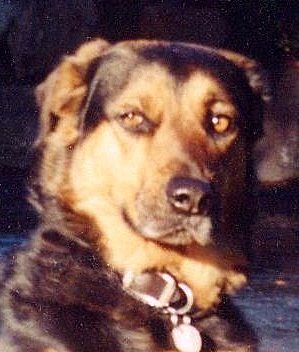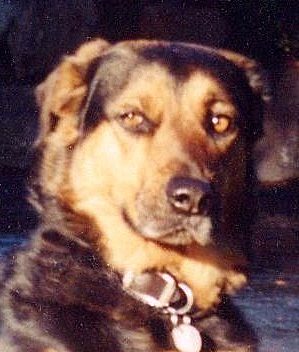

Legends Fade
I watched my DaVinci fade. Still magical and awe-inspiring but failing fast, frustrated with himself, remembering his glories, still burning with magic and desire and good will and heart, tremendous heart. But his dog body finally let him down after sixteen years, after so much glory and love and purpose and heroism. I had reverence and awe, panic and torment; I loved Lou like a brother, like a fan, like a father, and I knew it would not happen for me again.
But it was alright I thought, a great dog would happen again for someone else, maybe someone I knew. Maybe I’d play a role in it, like a Mr. Miyagi or a Henry Higgins. But for Lou and I it was the end of a famous thing no one would ever know about, it would disappear like spring snow unless I could write it well enough. So that’s what I did.
My memoir, Last Dog On The Hill: The Extraordinary Life Of Lou (St. Martin’s 2010) is a requiem to a swashbuckling, heroic, big-hearted soul, a Hollywood-handsome Rottweiler/shepherd mix who, born the feral offspring of guard dogs on a Mendocino marijuana grow, would pay back my rescue of him a hundredfold over the next sixteen years. Beyond saving my life twice, Lou’s bravery and daring allowed him to catch a Seattle rapist, foil a Los Angeles armed robbery, befriend a wolf, best a marauding coyote, and protect me from many aggressive dogs whose lives depended on my training expertise to save them from the needle.
Lou worked many years by my side as my training partner, not only as a bodyguard, but as a conduit into troubled, antisocial dogs’ hearts; his feral roots helped me reach into them, speak dog to them. Without Lou they would have all lived short, tormented lives, and left their owners guilt-ridden, and afraid to try it again.
Lou’s soft side let him work as a therapy dog at nursing homes, and at pre-schools, where he helped me teach dog safety. He even helped my partner Nicki, an ASL teacher, teach sign language to toddlers. Upon seeing how handsome Lou’s one hundred-fifty word vocabulary could be engaged not just verbally, but by our own brand of hand signals, they became motivated to learn ASL.
He was a savant- a perfect storm. His exploits and intellect changed my life. So when he began to fade, when his great body failed him after an unusually long life, part of me began to fade too. It was not at all fair, I thought, that such a dog, such a friend, should not live the longer lives of horses, parrots, tortoises. How can any of us bear their rise and fall, like a shooting star in the desert sky? As I wrote in Last Dog On The Hill:
"The essential crime committed against all dog owners is born of the love we hold for them, which, like the love of a child, runs deep. No parent should have to bury a child, they say, but that is what we dog owners must do, not once, but time after time, throughout our lives. While we remain unchangeable to their sweet eyes, they run from birth to the grave in an instant of our own measure. They burn like kindling, and though we know we can never replace one dog with another, we keep trying, in hopes of reviving hints of some great dog gone by. No; they are not children we bury. But dogs like Lou come close. They come very, very close."
They are not children, or brothers or parents or spouses. They are after all dogs. But if you are reading this, you know how much they mean, and how quickly they become part of us, part of the fabric of our lives.
Those with toy breeds get more time; those with giants, less. But either way, they fade, they go. And in our shock and stupor, we think that we can replace them with another just like them. And we try. I bet you have tried.
It never works. You can’t do it. I’ve tried and failed. You have also, or will soon enough.
So, what to do?
For me, the passing of Lou was devastating. Like a phantom limb, I could still feel him, could still hear him in the house, jingling, lapping water, tapping on the bedroom door to wake me. I could still smell him in the carpet. When I’d see neighborhood dogs he and I trained together, dogs who would have otherwise been sitting in urns on the mantle, I’d smile then recoil, reminded that he wouldn’t be waiting for me at home.
And so I wrote. For six months I poured out my heart and told the stories, everything this dog did, from watching Sidney Poitier practice his putting to playing fetch with a pine cone in front of Hemingway’s grave, or picking Italian plums with me, or chasing red squirrels up cedar trees in the cool Northwest spring, He was one hell of a dog.
I was lucky. I sold the book to St. Martin’s, and now it’s on the book stands. I got to tell the world about my dog. But what about you?
We all deal with the "fading" in our own ways. But I can share a few things with you that might make it easier, down the line:
- Keep a journal of the funny things your dog does. Later, it’ll make it easier to remember all the stories, which when told, help heal the heart.
- Take as many photos and videos as you possibly can. I didn’t; now I wish I had.
- Record your dog’s voice, and cast her paw prints in clay.
- If you have reduced the number of walks you take your old friend on, don’t. Every minute of exercise he gets will add a minute of life. Lou made it as long as he did partly because we walked and walked in those last years.
- Teach your old dog new tricks. It’ll keep her mind active, and create purpose and camaraderie.
- Read to your dog. They like it. Honest. Lou liked anything by Louis L’Amour.
- Take your older dog for a slow walk in the woods.
- Up the number of vet visits, and talk to your vet about how to best make your dog’s life as pain-free as possible.
- Give your dog a steak once a week. Watch him eat it.
- Build ramps in and around the home to make it easier for your dog to get around.
- Turn the heat up a few degrees in the winter, and use your AC during hot summers. Don’t worry about the expense. Your dog will appreciate it.
- Add Omega-3 oil to her food. It’s not cheap, but it helped Lou.
- Keep his weight down. You’ll add years to his life, and to your memories.
- Let her socialize with other dogs if she wants to, but don’t burden an old dog with too much youthful vigor.
- Take him to places he went to as a pup. He’ll remember and feel young again.
- Massage her twice a day.
- Know your old dog’s limitations; don’t make him jump up or down too high, or run too far. Walking makes it easier to smell the roses, and the cats, and the raccoons, and the new Borzoi down the block.
These are just some of the ways you can make more of the time left; I’m sure you can come up with many yourself.
In the end, as I said, they burn like kindling. But we are shepherds, stewards, and rescuers; we cannot imagine life without that charge. And, we know that another dog waits somewhere in a shelter or on the street or in a kennel, waiting to start her own history with you, a different history. No; you’ll never replace that one special dog, the one who changed your life. But the next dog has it’s own story to tell.
Join the newsletter and never miss out on dog content again!
"*" indicates required fields
By clicking the arrow, you agree to our web Terms of Use and Privacy & Cookie Policy. Easy unsubscribe links are provided in every email.